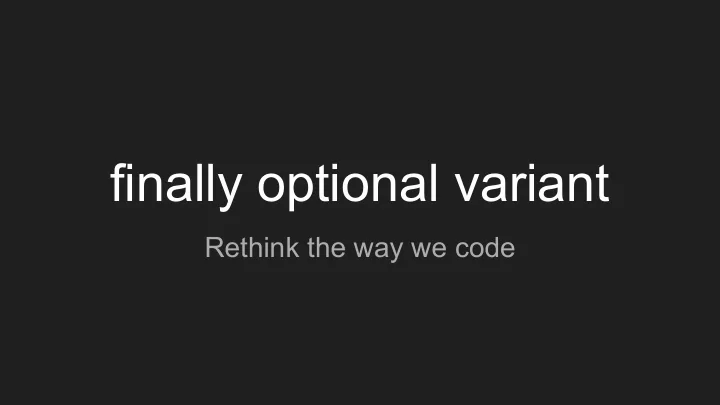

finally optional variant Rethink the way we code
Bio Kristoffel Pirard has been into C++ application development since the 20th century, including hardware integration, data processing and Qt app development. He is a programming enthusiastic with a strong interest in the power of functional programming techniques to achieve code correctness. He’s currently employed with Sioux Embedded Systems, where he started giving trainings in C++11/14.
Summary Finally optional & variant! The C++ type system has proven to be a great help in writing correct programs. C++17 adds two vocabulary types to improve code quality and performance. This talk will show how `std::optional` brings us new idioms to treat errors, letting the compiler help us to not mess up. We can have the power of checked error propagation without the cost of exception handlers. Also, we’ll shed our light onto `std::variant`, which adds an elegant way to deal with polymorphism. We will learn a surprising way to let the compiler check correctness of our state machines.
Overview ● Variant (15’) ○ Use case ○ Api ○ Example ● Optional (30’) ○ Use case ○ Api ○ (Category theory: sum types, function composition) ○ Example (15’) ● Questions
Overview ● Variant (15’) ○ Use case ○ Api ○ Example ● Optional (30’) ○ Use case ○ Api ○ (Category theory: sum types, function composition) ○ Example (15’) ● Questions
Variant: use case ● Polymorphism, but no ‘is-a’ relationship ● Storage reuse ● Examples ○ User selects one of many commands ○ Json-like data structures (! need recursion) ○ Representing changing state (cf. later)
Variant union U { int i; Remember `union`? double d; }; ● Either ● Don’t access `d` after `i` was written! (undefined behavior) ● You’ll need a type tag… ○ And a switch ○ And lots of code reviews struct DU { enum { Int, Double } type_tag; U u; }
Variant Enter C++17: ` std::variant ` ● type awareness ● all value-type goodies included ● Intuitive access... ○ Or is it...? Wait and see.
Variant: API ● Declaration: types known upfront ○ std::variant<int, double, Foo> u; Hint: using MyVariant = std::variant<int, double, Foo>; ○ ● Initialization ○ u = Foo{"hi"}; ○ u = 5L; => error: no match for ‘operator=’ ○ MyVariant v(std::in_place_type<Foo>, "hi"); ○ Default: first declared type, if default constructor ● Getting the current type ○ if(u.index() == 0){ stuff_with(std::get<0>(u)); } ○ if(auto *p = std::get_if<int>(&u)) { stuff_with(*p); } ○ This does not make me happy.
Variant: API - Visitation ● The `get` scaffolding looks… clumsy ● You can easily forget to handle a type (if the variant is extended with another type) ● => compiler, check my code, please.... Solved by `std::visit( visitor, u )` ○ Where `visitor` implements `operator()(T t)` for each type. ○ Still verbose… ○ But look! A nice trick with variadic templates on cppreference.com!
Variant: API - Visitation ● Like boost::variant : static_visitor struct ○ One operator(T) per type struct V { void operator() (int){ std::cout << "int\n"; }; void operator() (double){ std::cout << "double\n"; }; void operator() (Foo){ std::cout << "Foo\n"; }; } visitor; std::visit(visitor, u);
Variant: API - visitation std::visit(overloaded { [](auto arg) { std::cout << arg << ' '; }, [](double arg) { std::cout << std::fixed << arg << ' '; }, [](const std::string& arg) { std::cout << std::quoted(arg) << ' '; }, }, v); ● ! need user defined template deduction guides (C++17) ● Compiler warns you when forgetting a case!
Recommend
More recommend